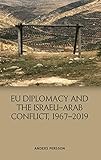EU Diplomacy and the Israeli–Arab Conflict, 1967–2019 / Anders Persson.
Material type: TextPublisher: Edinburgh : Edinburgh University Press, [2022]Copyright date: ©2020Description: 1 online resource (232 p.) : 5 B/W tablesContent type:
TextPublisher: Edinburgh : Edinburgh University Press, [2022]Copyright date: ©2020Description: 1 online resource (232 p.) : 5 B/W tablesContent type: - 9781474474726
- 9781474474757
- 956.05/3 23
- DS119.7 .P47 2020eb
- online - DeGruyter
| Item type | Current library | Call number | URL | Status | Notes | Barcode | |
|---|---|---|---|---|---|---|---|
 eBook
eBook
|
Biblioteca "Angelicum" Pont. Univ. S.Tommaso d'Aquino Nuvola online | online - DeGruyter (Browse shelf(Opens below)) | Online access | Not for loan (Accesso limitato) | Accesso per gli utenti autorizzati / Access for authorized users | (dgr)9781474474757 |
Frontmatter -- CONTENTS -- TABLES -- FOREWORD -- ACKNOWLEDGEMENTS -- 1 MORE IMPORTANT THAN OTHER CONFLICTS -- 2 1967–79: A ‘MARVELLOUS OPPORTUNITY’ OPENS UP FOR THE EC’S EMERGING FOREIGN POLICY -- 3 1980–91: FORWARD-THINKING ON THE LONG ROAD TO OSLO -- 4 1991–2000: PEACE THROUGH REGIONAL COOPERATION -- 5 2000–9: THE ISRAELI–ARAB CONFLICT IN THE 9/11 ERA -- 6 2009–19: UPHOLDING THE SACRED FLAME OF THE TWO-STATE SOLUTION -- 7 CONCLUSIONS: THE PAST FIFTY YEARS – AND THE NEXT? -- REFERENCES TO THE BULLETIN -- REFERENCES TO EU DECLARATIONS, PRESS RELEASES AND OTHER PUBLICATIONS -- REFERENCES TO OTHER LITERATURE -- CODING SCHEDULE -- INDEX
restricted access online access with authorization star
http://purl.org/coar/access_right/c_16ec
Argues that the Israeli-Arab conflict has been more important for the EU than other conflictProvides a reader-friendly historical overview with chronologically organised chapters for a quick reference of the EU’s position on a specific eventCovers recent events that contributed to the fragmentation of the EU’s policy vis-à-vis the conflict, such as the election of Donald Trump, Brexit, and the rise of right-wing, nationalist or populist parties and governments in EuropeIntroduces an innovative methodology applicable to similar studies of the Bulletin of the European Communities/European Union that trace other aspects of EU policyIncludes an annotated selection of key EC/EU declarations on the Israeli-Arab conflict in an appendixNearly 50 years since the European Foreign Ministers issued their first declaration on the conflict between Israel and Palestine in 1971, the EU continues to have close political and economic ties with the region. Based exclusively on primary sources, this study offers an up-to-date overview of EU’s involvement in the Israeli-Arab conflict since 1967. It utilises an innovative methodology to analyse keyword frequency in a sample of more than 2300 declarations and statements published in the Bulletin of the European Communities/European Union (1967–2009) as well as council reports and press interviews (2009–2018) to uncover broad patterns for qualitative analysis. The outcomes suggest that the Israeli-Arab conflict is more important to the EU than any other conflict, having been key to shaping EU’s foreign policy overall.
Mode of access: Internet via World Wide Web.
In English.
Description based on online resource; title from PDF title page (publisher's Web site, viewed 27. Jan 2023)


